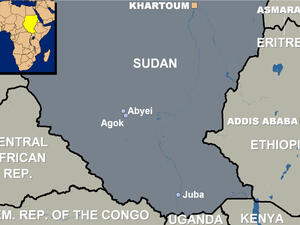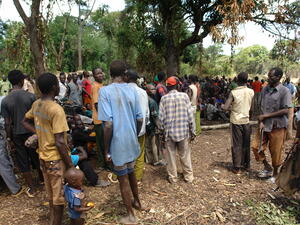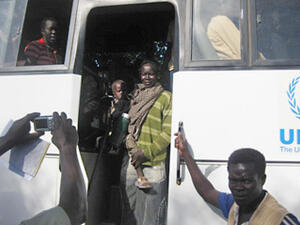South Sudan: 100,000 have now returned
South Sudan: 100,000 have now returned
The number of Sudanese refugees who have returned home since the launch of voluntary repatriation to South Sudan in 2005 has now surpassed 100,000. The 100,000 mark was reached over the weekend. Airlifts on Friday, in partnership with IOM [International Organization for Migration], from Central African Republic (CAR) to Juba, the capital of South Sudan and a road convoy from Kakuma camp in Kenya to Kapoeta in Eastern Equatoria brought the total number of returns to South Sudan from seven neighbouring countries to 100,574. This also brings the total number of Sudanese refugees assisted to return home by UNHCR to more than 30,000. Repatriation from CAR, the Democratic Republic of the Congo (DRC), Uganda, Kenya and Ethiopia, are conducted under tripartite agreements and take place by air and by road through various border crossing points.
The returnees are given an aid package of basic household supplies, including blankets, mosquito nets, soap, plastic mats, kitchen sets, jerry cans and sanitary items to help them restart their lives in Sudan. Upon return, they also receive a three- month food ration from WFP [World Food Programme] and seeds and tools from FAO [Food and Agriculture Organization]. All returnees, as well as internally displaced persons and receiving communities, equally benefit from UNHCR community-based reintegration projects focusing on water, health and education in areas of return.
More than 100,000 Sudanese refugees are expected to return home from neighbouring countries in 2007. But this depends on an improved security situation, progress in peace talks between the Lord's Resistance Army and the Government of Uganda, which hosts the largest Sudanese refugee population (156,000), and unforeseen events that can affect returns such as a recent meningitis outbreak in northern Uganda. Movements from northern Uganda have been suspended for several weeks pending the vaccination of potential returnees.
Some of the South Sudan refugees will return with transport organized by UNHCR and other partners from refugee camps or settlements. Under an assisted, self-organised repatriation programme, others will receive return documents (Voluntary Repatriation Form) and a return and reintegration package in the country of asylum and upon arrival in Sudan. Thousands more are expected to return home using their own means in what is commonly referred to as spontaneous repatriation.
We have held a series of cross-border meetings with neighbouring countries to firm up repatriation plans for 2007. This includes establishing new calendars for resumed operations from areas such as north-eastern DRC and opening new return routes such as the Dimma/Gambella (Ethiopia) to Pagak corridor in Upper Nile. Repatriation from Ethiopia will be discussed further at an upcoming Tripartite Commission meeting to be held in the Ethiopian capital, Addis Ababa, among the governments of Ethiopia, Sudan and UNHCR on Thursday and Friday. An estimated 340,000 Sudanese refugees remain in exile, mainly in Kenya, Uganda and Ethiopia.







